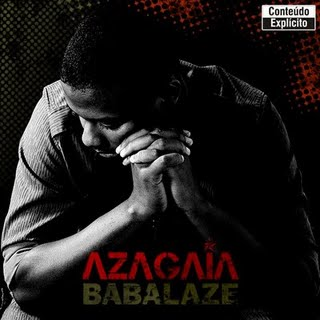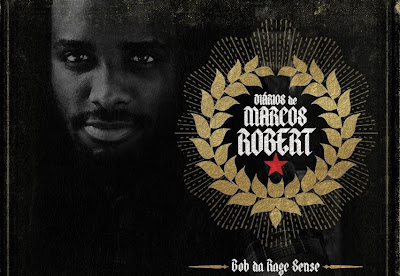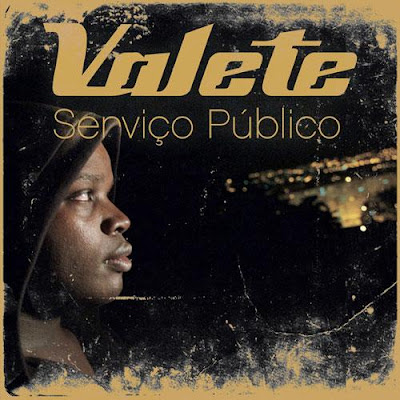Halloween, the man who shook me from my writing lethargy.
One of my (many) handicaps with Lusophone music is my lack of in-depth knowledge of Portuguese rap, from Portugal. I’m completely in tune with the hip-hop scene in Angola, I’ve listened to almost everything that
Azagaia from Mozambique has put out, I’ve scratched the surface of Brazilian hip-hop, but when it comes to Portuguese hip-hop, the one that started it all in the Lusophone world, I’m woefully inadequate.
There is a particular Portuguese rapper however that I have been vaguely aware of for quite some time now. My cousin Anderson, the same guy who introduced me to
Valete, had told me about man who went by the name of Halloween and was unlike any hip-hop artist he had ever seen. I never really got into Halloween and didn't take my cousins advice seriously. Some years later Halloween did a concert in Luanda and people went nuts. I still didn't feel the urge to listen to his stuff.
That all changed on a recent trip to Lisbon. I was with friends, amongst them a Lusophone rapper, and the topic of Halloween came up. My friend and the rapper disagreed about Halloween’s skill and street credibility, but both agreed that his song No Love, included below, was immense. They played it from the speakers, and that was the first time I heard Halloween rap.
Once I got bit, it was difficult to stop. I've been listening to him for the better part of the last two months. Halloween, born Allen Pires Sanhá in Guinea-Bissau, also known as
Allen Halloween or Bruxa (Witch), is quite unlike any Lusophone rapper I have listened to. It’s difficult to describe his sound, but I will say that it’s the grittiest, bleakest, rawest but yet conscious and instrospective brand of Lusophone hip-hop I have ever heard. One second he is rapping about stealing money, the next he’s lamenting about how a life of crime is simply not worth it. Shy and anti-social, He sees himself and his crew for what they are, and has a bleak, brutally honest way of assessing his contribution to the world. We are, in effect, listening to a product of his environment, a man who’s habitat is Lisbon’s notorious slums and poverty-stricken streets, wasteland of the many African immigrants that flocked here from Cape Verde, Guinea-Bissau, Angola, etc.
Through interviews and through his rhymes Halloween has told his story of neglect, drugs, and street crime, and you can hear the pain, anguish, and anger in his voice. The haunting drawl with which he raps, especially in No Love, is particularly striking. So far I’ve only listened to his debut album, Projecto Mary Witch (2006), and among the tracks that are tame enough for me to share them here with you, seeing how this site is more associated with Bossa Nova music, is SOS Mundo, the memorable No Love, and Várias Vidas. Yes, No Love is the standout, the one that even rappers who dislike him give him props for, but SOS Mundo, an exposé into the failures of society, and Várias Vidas, in which he chronicles the doomed life of his friends that couldn’t give up on a life of crime, are excellent examples of “Hip-Hop Tuga” at its finest. But the most iconic song on this album remains "Dia de Um Dread de 16 Anos" (A Day in the Life of a 16 year-old Thug), a 10 minute sojourn into a nightmare of despair, crime, and drugs.
SOS Mundo
No Love
Várias Vidas
Halloween, o homem que sacudiu-me da minha letargia e fez-me escrever no Lounge depois de largas semanas de ausência.
Um dos (vários) buracos que tenho no meu conhecimento da música lusófona é a minha falta de conhecimento profundo do hip-hop Português própriamente dito. Oiço nomes por alto – Da Weasel, Sam the Kid, Mind da Gap – mas nunca explorei com dedicação as suas músicas. Já com o hip-hop angolano não perco um álbum de todos os artistas que aprecio, já ouvi quase tudo que há para ouvir do moçambicano
Azagaia, e aos poucos vou conhecendo melhor o hip-hop brasileiro. Mas quanto a Portugal, sou um zero à esquerda.
Mas há um rapper Português em particular cujo nome oiço falar há vários anos. O meu primo Anderson, o mesmo rapaz que me introduziu ao
Valete falou-me de um rapper ‘estranho’ mas muito habilidoso que respondia pelo nome de Halloween. Um rapper que era diferente de todos os rappers que ele ouvia na altura. Por qualquer razão e não obstante a sugestão do meu primo, tive pouco interesse em ouvir as músicas do Halloween na altura. Alguns anos depois o Halloween foi para Luanda para delírio do público lá, e mesmo assim eu nada.
Tudo mudou quando estive em Lisboa recentemente. Estava com amigos, entre eles um rapper lusófono, e surgiu uma discussão acalorada sobre os méritos (ou não) do Halloween. A certa algura os dois amigos concordam que sim, mesmo discordando do valor do Halloween, podiam os dois acordar que a música No Love (incluída acima) era uma coisa rara, das melhores músicas de hip-hop Tuga que ambos tinham ouvido. Tocaram-na dos speakers e foi assim que ouvi o Halloween pela primeira vez. No Love foi a minha introdução ao universo peculiar do Halloween.
Foi como se um bichinho tivesse me mordido. Ando a ouvir o Halloween há dois meses, quase todos os dias. A tentar perceber as letras, a sentir-lhes, a acompanhar um ritmo das rimas, a conhecer o homem pela sua escrita. O Halloween, nascido em Bissau como Allen Pires Sanhá e também conhecido como Allen Halloween ou Bruxa, é completamente diferente de qualquer outro rapper lusófono que já ouvi. E no mundo do hip-hop de hoje, em que rappers parecem ser sósias um dos outros, isto é positivo. É difícil descrever o seu som, mas posso dizer que é do rap mais cru, real, e um tanto quanto radical (fiel às raízes), mas ao mesmo tempo consciente e introspectivo, que eu jamais ouvi. Num som está a rimar sobre roubar dinehiro duma velhota, no outro está a alertar aos mais jovens que a vida do crime não compensa. Pelo que ouvi, o mano é um tanto quanto anti-social e introvertido, e tem uma maneira muito dele e muito honesta de encarar a sua vida, sua e da sua crew. Assume o que é, sem pedir licença a ninguém. Nota-se que estamos perante um homem que viveu o que relata e é um producto dos piores bairros de Lisboa, os bairros de miséria onde habitam imigrantes africanos constantemente marginilazidos pela sociedade.
Pelas suas
entrevistas e pelas suas rimas o Halloween conta uma história de marginalização, drogas e crime, e ouve-se a dor, a angústia e a raiva na sua voz. Mas em alguns sons o mano também demonstra um certo sentido de humor. A maneira como ele voca é impar...a performance dele no No Love é particularmente memorável. Até agora ainda só ouvi o seu primeiro álbum, o Projecto Mary Witch (2006) e entre as músicas suficientemente “calmas” que posso partilhar aqui neste espaço, já que vos habituei a bossas e reggaes inofensivos, estão SOS Mundo, No Love, e Várias Vidas. Oiçam a letra com atenção. Oiçam cada música várias vezes, com calma. E quando terminarem, procurem ouvir “Dia de um Dread de 16 Anos”. É um pesadelo de 10 minutos mas talvez dos sons mais icônicos do mano.
















 Alternativos
Alternativos























